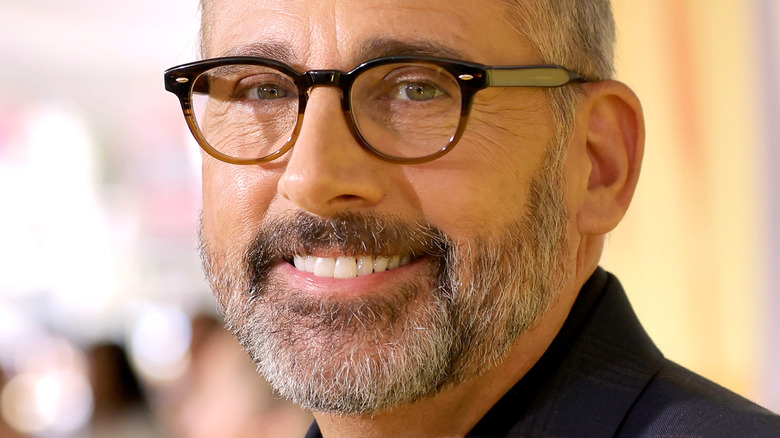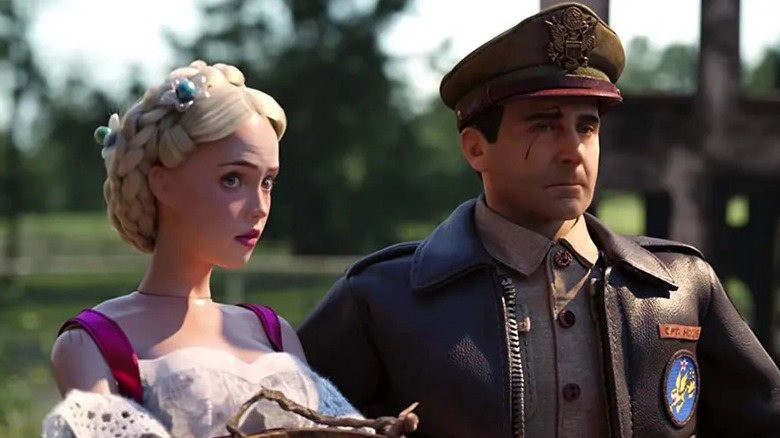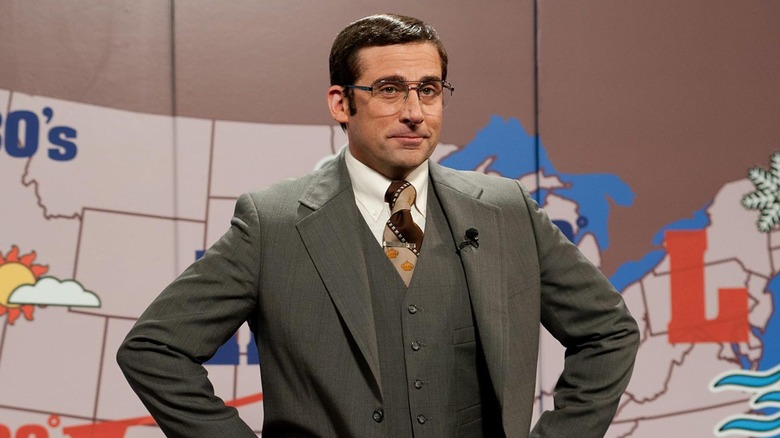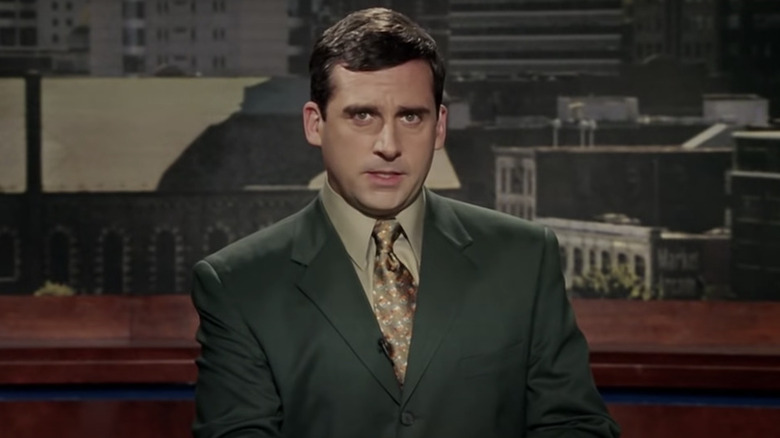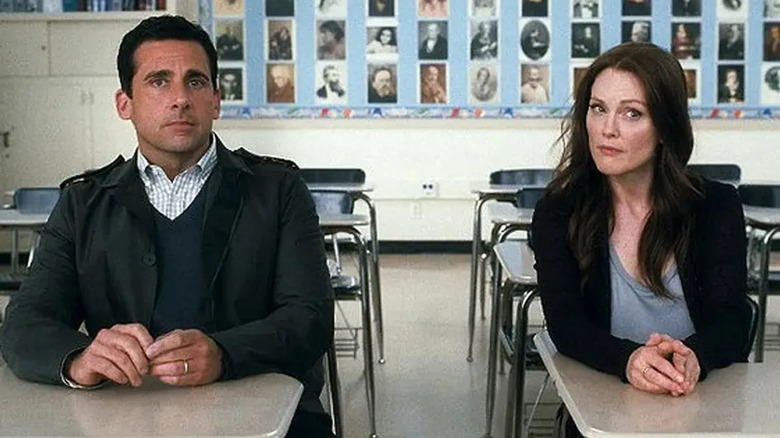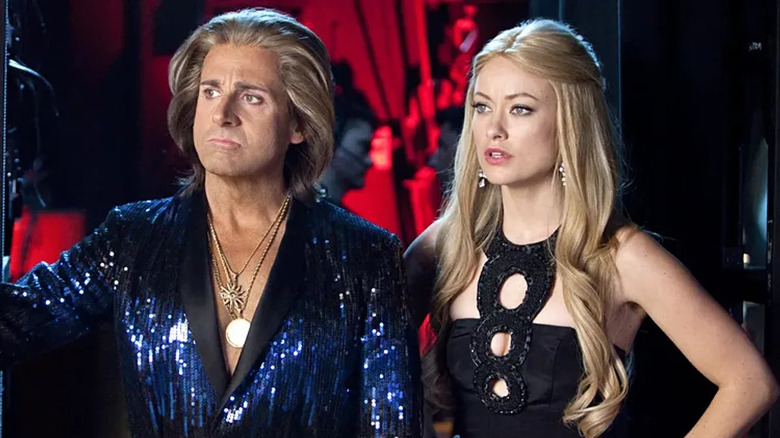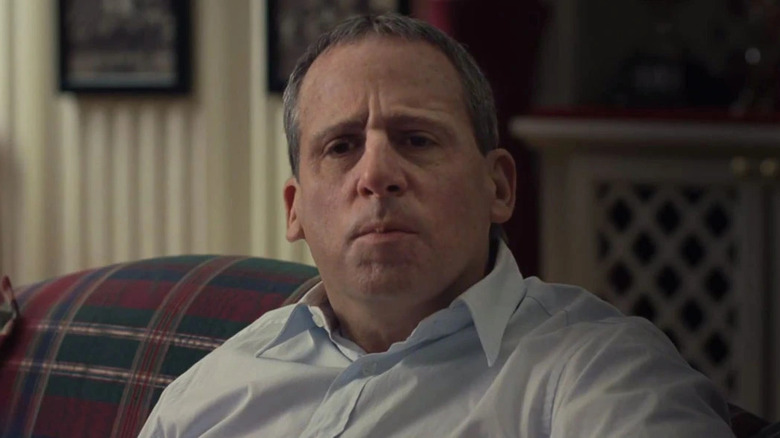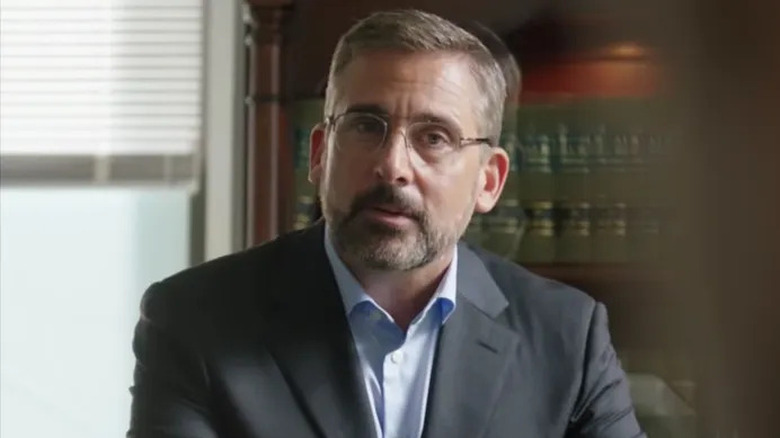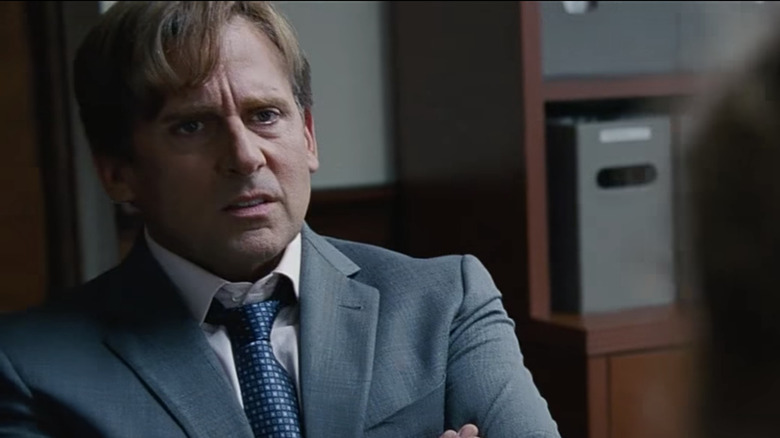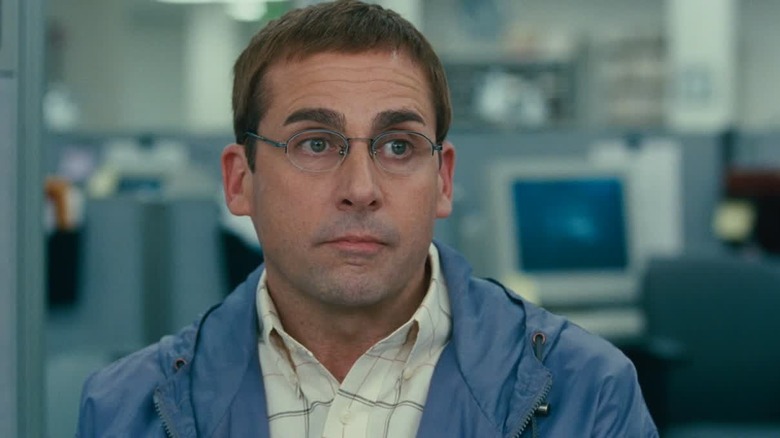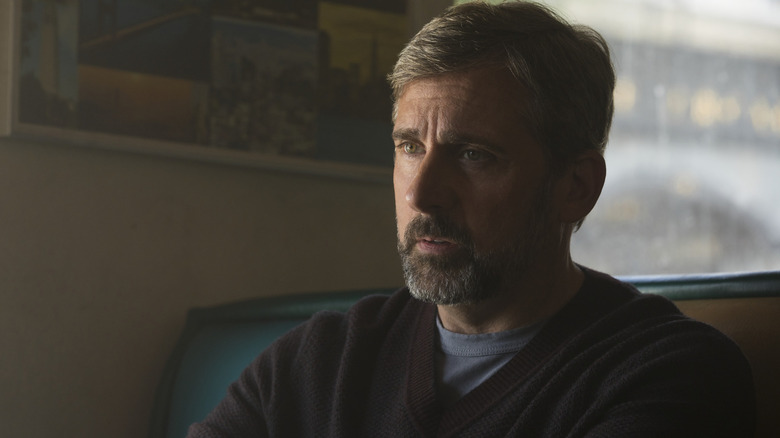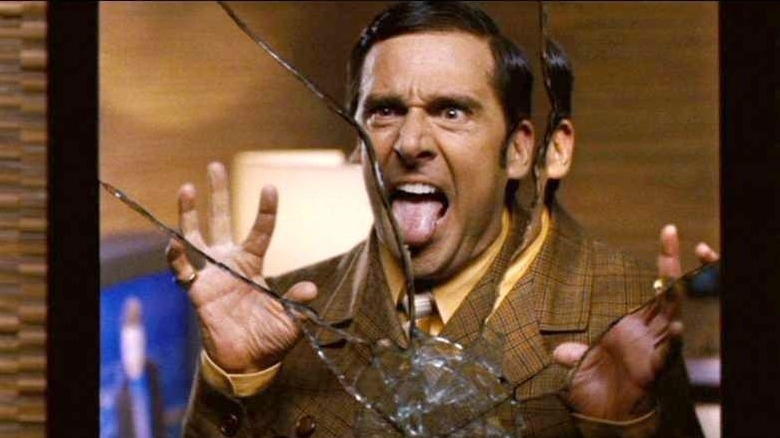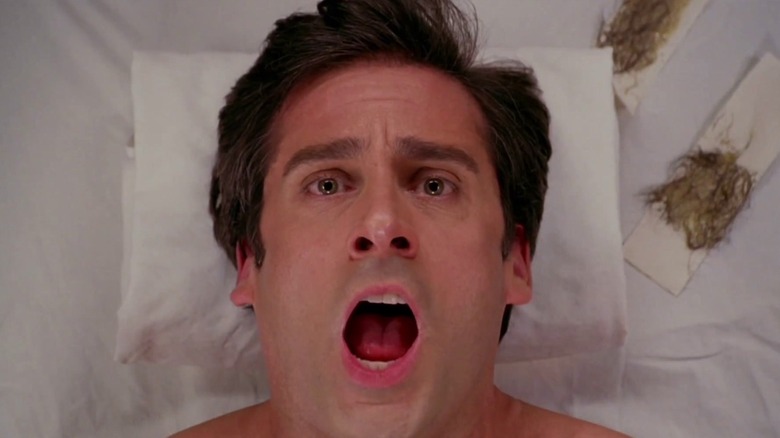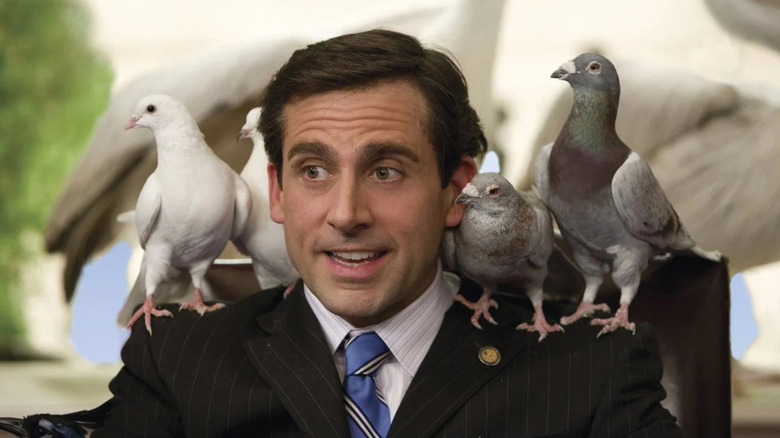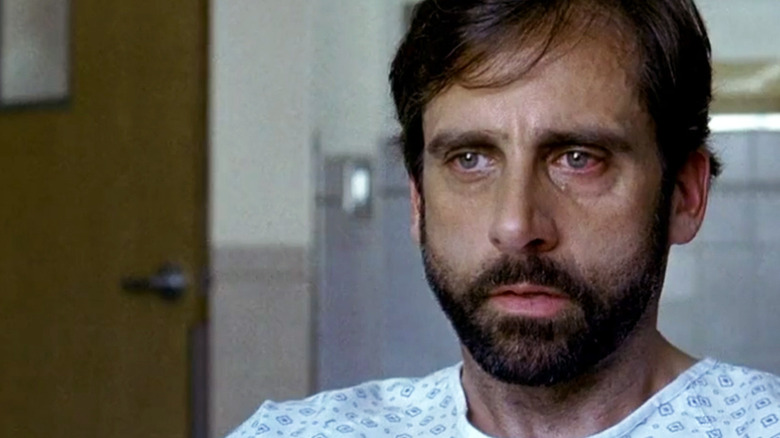Steve Carell's 7 Best And 7 Worst Movies Ranked
Steve Carell is the kind of actor who only comes along once every so often. Gifted with wondrous comedic timing and an aptitude for more serious roles as well, he's a performer able to oscillate between comedy and drama with ease. As diverse an actor as there is, Carell has made a name for himself as someone able to tackle any and all challenges he has in mind — whether that means headlining the reboot of a beloved BBC comedy series, or receiving an Oscar nomination for one of his more dramatic performances.
Getting his start in recurring roles on comedy series like "The Dana Carvey Show" and "The Daily Show with Jon Stewart," Carell quietly rose up the ranks in the entertainment industry throughout the late '90s and early 2000s. First appearing in relatively small but memorable parts in movies like "Anchorman: The Legend of Ron Burgundy," Carell achieved stardom in Hollywood with starring roles in "The Office" and "The 40-Year-Old Virgin." Since then, Carell has gone on to garner success within numerous genres, enjoying a prosperous and successful film and television career, with Life magazine even naming him "America's Funniest Man" in 2019.
Like every actor, Carell has appeared in a number of films that were great, while others were less than stellar. Here are some of the best movies Steve Carell has been featured in, as well some of the worst movies he'd probably like you to forget about.
Worst: Welcome to Marwen
In 2018, Carell was flying high with his more grounded, dramatic performances in films like "Beautiful Boy" and "Vice," each of which earned him significant acclaim from critics. Though overall a strong year for Carell, he would conclude 2018 by starring in the disappointing Robert Zemeckis film, "Welcome to Marwen."
In the film, based on a heartbreaking true story, artist Mark Hogancamp (Carell) is nearly beaten to death by a group of white supremacists after revealing them to his penchant for wearing women's shoes. Left with severe brain damage and unable to remember much of his past, Hogancamp begins constructing an elaborate fantasy world in his backyard using miniature figures that represent himself, his friends, and even his attackers to cope with the pain of the assault.
A collaboration between Carell and Zemeckis sounds like a match made in heaven on paper. Unfortunately, the finished result failed to capitalize on Carell's capabilities as an actor or do justice to Hogancamp's incredible life story. Upon its release, critics were divided on their opinions of the film: some praised the animation and performances (especially Carell's), while many criticized the film's overall execution. "For all of its CGI wizardry, the drama of 'Welcome to Marwen' winds up feeling as artificially manufactured as the miniature figurines who bring it to life," said IndieWire's David Ehrlich.
Best: Anchorman - The Legend of Ron Burgundy
Carell's first major cinematic performance came in 2004's "Anchorman: The Legend of Ron Burgundy." Set in the chauvinistic world of 1970s newscasters, the film stars Will Ferrell as the dim-witted title character, who's one of the top-rated news anchors in the industry. But his cushy lifestyle and prominent billing comes under threat with the arrival of an ambitious new reporter (Christina Applegate) at the station.
One of the movies that made Ferrell a household name after his groundbreaking time at "Saturday Night Live," "Anchorman: The Legend of Ron Burgundy" has been called one of the best comedies of all time. The success of the film resulted in a financially successful sequel and a podcast hosted by Ferrell, while in character as Burgundy. "Ferrell has seized on a clever concept rife with possibilities — namely, women breaking the glass ceiling in male-dominated TV news during the '70s — and smartly surrounded himself with a topnotch cast," wrote Variety's Brian Lowry.
In the film, Carell portrays the even more dim-witted weatherman and one of Burgundy's closest friends, Brick Tamland. It's a small role, but Carell works wonders with it, consistently managing to steal practically every scene he's in. Carell's performance in the film was not only warmly received by critics, but also piqued the interest of director Judd Apatow, leading to their collaboration on Carell's breakthrough starring role in "The 40-Year-Old Virgin."
Worst: Bruce Almighty
Another of Carell's earliest film roles came with the 2003 fantasy comedy, "Bruce Almighty," opposite Jim Carrey. In the film, Carrey plays Bruce, a news reporter with chronic bad luck who openly criticizes God for his unfortunate hand in life. To teach Bruce a lesson and show him how good life can be, God (Morgan Freeman) gives him near omnipotent powers, allowing him to effectively be God for a short period of time.
At the times of its release, "Bruce Almighty" was a great commercial success at the box office, earning over $484 million against a budget of $81 million (via Box Office Mojo). Despite its massive financial earnings, though, reviews for the film were less than enthusiastic. "There's remarkably little done with a premise snatched from high-concept heaven, adding yet another file to the growing cabinet of under-realized comedies," opined Variety's Robert Koehler.
"Bruce Almighty" sees Carell in the supporting role of Evan Baxter, a news anchor employed at the same station as Bruce, as well as Bruce's chief workplace rival. In one brief but memorable scene, Bruce uses his powers to make Evan spout utter nonsense live on television in arguably one of the movie's funniest moments. The movie is a fairly minor footnote in Carell's filmography, but it's still amazing to see him shine bright in a film that was considered mediocre at best.
Best: Crazy, Stupid, Love.
A film that mixes laughs with plenty of emotionally gripping moments, "Crazy, Stupid, Love." was a turning point of sorts for Carell's career. In this 2011 romantic comedy, Carell and costar Julianne Moore are a middle-aged couple who decide to separate. Now on his own and struggling to get past the failures of his marriage, the husband is taught how to confidently meet women by a young, handsome Lothario (Ryan Gosling).
A humorous comedy of manners featuring several interweaving storylines surrounding different relationships, "Crazy, Stupid, Love." drew favorable numbers at the box office — earning $145 million against a budget of $50 million (via Box Office Mojo) — and raked in predominantly positive reviews. "'Crazy, Stupid, Love' is on balance, remarkably sane and reasonably smart," said The New York Times' A.O. Scott.
Carell introduces a more emotional element to his character here instead of his usual brand of quirky oddball protagonists. Grounding the role with more sobering characteristics and having him unsure of how to carry on after the collapse of his marriage, Carell is slightly more tragic than he is simply funny — a man unsure of how to win back the love of his life or how to carry on once she's left him. As one of the final films of Carell's "comedic period" from 2005 to 2013, "Crazy, Stupid, Love." also marked a turning point towards meatier, more realistic characters in his later projects.
Worst: The Incredible Burt Wonderstone
By the early 2010s, Steve Carell was beginning to slightly distance himself from comedy and branch out into dramas and drastically different characters. One of the final films released during Carell's comedic phase was 2013's "The Incredible Burt Wonderstone," a project on which Carell also served as a producer.
A spoof on famous Las Vegas magic acts like Siegfried and Roy, "The Incredible Burt Wonderstone" follows the eponymous Burt Wonderstone (Carell), a narcissistic, spoiled magician whose best days seem behind him. When a popular new street magician (Jim Carrey) threatens to supersede his own act, Wonderstone reaches out to his former partner (Steve Buscemi) with the prospect of making a career-changing comeback.
While the idea of seeing Carrey and Carell as onscreen rivals seems promising, the film's execution of such an epic showdown utterly fails to live up to the expectations. A massive box office flop, grossing $27.4 million against a $30 million budget (via Box Office Mojo), the movie was criticized for its predictability (via EW) and incredibly uneven tone (via Empire). Carell himself hands in a decent turn as Wonderstone, but most of the movie's meager praise (per Variety) was directed instead towards Carrey, who remains one of the film's strongest highlights.
Best: Foxcatcher
Carell's most celebrated role came in 2014's "Foxcatcher," a film that was a far cry from the early humorous characters and comedic films Carell had mastered in the decade prior. Mark Schultz (Channing Tatum) is an accomplished US Olympic gold medal-winning wrestler who is growing tired of living in his brother Dave's (Mark Ruffalo) shadow. When the eccentric wrestling coach John du Pont (Carell) approaches Mark with the idea of joining his team, Mark agrees, his friendship with du Pont and his relationship with his brother slowly spiraling out of control.
Loosely based on the true circumstances surrounding the 1986 murder of Dave Schultz, "Foxcatcher" is an enthralling look at one of the darkest and most tragic stories of an Olympic athlete there is. Competing for the Palme d'Or at Cannes in 2014, the movie received Academy Award nominations for Best Actor (Carell), Best Supporting Actor (Ruffalo), and Best Director (Bennett Miller). It also received Golden Globe nominations for Best Motion Picture – Drama, Best Actor (Carell), and Best Supporting Actor (Ruffalo).
"Foxcatcher" remains one of the movies for which Carell has received the highest number of accolades. Basing his performance heavily on his historical counterpart, Carell plays him well, getting the voice, mannerisms, and facial ticks all down perfectly. Despite his massive wealth and privileged upbringing, du Pont's a miserable, empty shell of a man with no one who truly cares for or loves him. Carell convincingly captures the man's tragic nature and inner emotional turmoil.
Worst: Irresistible
In 2020, Carell reunited with his former "The Daily Show" colleague, Jon Stewart, in Stewart's directorial effort, a political comedy called "Irresistible." The film follows longtime Democratic campaign strategist Gary Zimmer (Carell), who travels to Wisconsin to help a Democratic candidate (Chris Cooper) run for mayor in a small, right-wing town.
While "Irresistible" has a decent supporting cast that includes Carell, Cooper, Rose Byrne, Mackenzie Davis, Natasha Lyonne, and Topher Grace at its disposal, the movie falls flat in a number of ways. In particular, most critics felt the movie was too "soft" in its political satire — the exact word used to describe the movie on its Rotten Tomatoes page.
"You wish it were a bold satirical bulletin, or maybe just Stewart's pricelessly amusing version of a Christopher Guest movie. Instead, the film is a lot like a politician: It makes a big show of leading the viewer, but without rocking the boat," said Variety's Owen Gleiberman. Not even a characteristically strong leading performance by Carell was enough to save the movie from predominantly negative reviews.
Best: The Big Short
In 2015, Carell signed on to star in "Anchorman" director Adam McKay's faux-documentary take on the 2008 housing crisis that ultimately led to the Great Recession. An ensemble piece, the film follows a group of investors who realize the housing bubble is about to burst, and that a serious financial situation with worldwide consequences is on the horizon. Based on Michael Lewis's best-selling non-fiction book of the same name, the movie stars Carell, Christian Bale, Ryan Gosling, and Brad Pitt, among numerous others.
Regularly breaking the fourth wall to explain economic terms in a straightforward, easy-to-understand way, "The Big Short" was universally acclaimed upon its release. It earned $133.4 million against a budget of $50 million (via Box Office Mojo), and garnered several prestigious award nominations, including the Academy Award for Best Picture, Best Supporting Actor (Bale) and Best Director (it won for Best Adapted Screenplay).
In the film, Carell plays Mark Baum, the head of a small trading firm, loosely based on investor Steve Eisman. As one of the four main characters, Carell more than manages to build a fully-realized personality for Mark, displaying a sense of anxiety and urgency as he investigates America's inherently problematic banking systems. Opposite world-renowned stars like Bale, Pitt, and Gosling, Carell holds his own with a more realistic performance, showing just how far he'd come as an actor since the mid-2000s.
Worst: Dinner for Schmucks
A movie based on the far better, far funnier 1998 French film, "Le Dîner de Cons," 2008's "Dinner for Schmucks" follows Tim (Paul Rudd), a fast-rising business executive invited to attend a bizarre dinner party thrown by his boss (Bruce Greenwood). All party attendees are expected to bring, as a practical joke, an eccentric individual with them as a plus one. Looking for the strangest person he can find, Tim eventually stumbles across Barry (Steve Carell), a lovable, unintelligent oddball who has no sense of boundaries or personal space whatsoever.
Despite an impressive lineup of talented actors and comedians like Carell, Rudd, Jemaine Clement, Jeff Dunham, Ron Livingston, Zach Galifianakis, and Octavia Spencer, "Dinner for Schmucks" failed to live to its promising concept. Grossing just $86.8 million against a $69 million budget (via Box Office Mojo), the film earned mostly mixed to negative reviews.
However, some critics were complimentary towards Carell's performance in the film, feeling it was one of the few strong aspects that made the movie worth seeing. "The genius of this version depends on the performance by Steve Carell, who plays Barry Speck as a man impervious to insult and utterly at peace with himself. He's truly a transcendent idiot," said respected film critic Roger Ebert.
Best: Beautiful Boy
Based on the inspirational life stories of David and Nic Sheff, a father and son whose relationship was mired by rampant drug addiction, "Beautiful Boy" follows Nic's (Timothée Chalamet) continuous struggle with substance abuse and the immediate effect it has on his father (Carell). As Nic's addiction worsens, David consistently tries to support his son any way he can, all the while slowly accepting how powerless he is when it comes to Nic's drug dependency.
An emotional portrait of a family torn apart by addiction, "Beautiful Boy" received only mixed reviews, but Chalamet and Carell's performances were praised by critics. For his role in the film, Chalamet earned BAFTA, Golden Globe, and Screen Actors Guild Award nominations for Best Supporting Actor.
Carell does an amazing job depicting the emotional struggle of a father coming to terms with his son's addiction. Desperate, afraid, and anxious to do what he can do to help, Carell brings out all the tragedy and helplessness one feels when you're unable to aid a loved one's recovery. However, in some of the movie's warmest scenes, Carell also brings in a good amount of fatherly pride and appreciation for his son, silently rooting for him from the background and leaving his recovery in Nic's own hands.
If you or anyone you know is struggling with addiction issues, help is available. Visit the Substance Abuse and Mental Health Services Administration website or contact SAMHSA's National Helpline at 1-800-662-HELP (4357).
Worst: Bewitched
In 2005, Carell scored a small but integral role in the romantic comedy-fantasy film, "Bewitched," based on the classic sitcom of the same name. Hoping to get his career back on track after a recent string of failures, an egotistical actor (Will Ferrell) tries to reboot "Bewitched" with an unknown actress he can outshine. Chancing upon the perfect actress for the part (Nicole Kidman), the actor quickly realizes that he bit off more than he can chew when he discovers she's actually a real witch.
With how popular the original series was throughout the 1960s, the 2005 adaptation of "Bewitched" had a lot to live up to. Sadly, the finished product was nothing short of a catastrophe, drawing in almost entirely negative reviews. Carell figures into the movie as Uncle Arthur, a character taken straight from the original "Bewitched" series and initially played by Paul Lynde. Focusing on the character's most theatrical mannerisms and voice, Carell goes full camp with his presentation of Arthur, talking some sense into Ferrell's main character near the movie's climax. It's a very small role, but Carell's enjoyably over-the-top performance arguably serves as the single positive thing about the whole movie.
Best: The 40-Year-Old Virgin
As previously mentioned, "The 40-Year-Old Virgin" is perhaps the most important film in Carell's career, containing what's considered his breakthrough cinematic performance. The film — co-written by Carell and the movie's director, Judd Apatow — follows Andy (Carell), a kind-hearted 40-year-old electronics store employee who, as his coworkers discover, is secretly a virgin. Hoping to help their friend out, Andy's colleagues set him up on a number of dates in an effort for him to lose his virginity, only for Andy to fall in love with someone (Catherine Keener) in a more serious, heartfelt way.
A fun, lighthearted, appropriately raunchy romantic comedy bolstered by an impressive cast (including Paul Rudd, Jane Lynch, Romany Malco, Seth Rogen, and Elizabeth Banks), "The 40-Year-Old Virgin" marked Carell's ascension in the entertainment industry. Many critics were appreciative of his performance in the film, as well as the movie's writing, its underlying relatable themes and its surprising maturity. Variety's Owen Gleiberman wrote, "Carell plays Andy ... in the most surprising way possible: as a credible human being."
The success of the movie and his starring role on "The Office" directly led to Carell's status as a leading man in the years following this film. It also ushered in a prolonged period in comedy for Carell that saw him star in several critically and/or commercially successful films like "Little Miss Sunshine," "Get Smart," and "Despicable Me."
Worst: Evan Almighty
A 2007 follow-up to 2003's "Bruce Almighty," "Evan Almighty" follows Carell's character from the previous film, Evan Baxter. Having left his position as a news anchor behind, Evan pursues a promising career as a United States Congressman, hoping to change the world. When God (Morgan Freeman) warns of a coming flood, he tasks with Evan with building an ark to house everyone nearby, effectively making Evan the modern version of Noah.
At the time, "Evan Almighty" was one of the most expensive comedies ever made, with a whopping budget of $175 million. Unfortunately, it was a gamble that failed to pay off for the studio: the film grossed only $174.4 million (per Box Office Mojo), incurring an estimated loss of $100 million or more (via Bomb Report). On top of its financial loss, the movie drew an almost entirely negative response from critics, with the Chicago Sun-Times' Richard Roeper calling it one of the worst sequels of all time. "'Evan Almighty' is a paper-thin alleged comedy with a laugh drought of biblical proportions, and a condescendingly simplistic spiritual message," said Roeper.
"Evan Almighty" is without a doubt the worst movie Carell has ever appeared in, but a number of reviews pointed out that his performance slightly improved the overall quality of the movie. The Star-Ledger specifically named Carell's performance as the movie's one redeemable quality, favorably comparing his comedic abilities to those of Jim Carrey.
Best: Little Miss Sunshine
One of Carell's first forays into drama came surprisingly early in his career, not long after he became one of the chief comedic actors in Hollywood thanks to "The Office" and "The 40-Year-Old Virgin." In "Little Miss Sunshine," Carell stars alongside an ensemble cast that includes Greg Kinnear, Toni Collette, Paul Dano, Abigail Breslin, and Alan Arkin as a family traveling to a beauty pageant that their young daughter (Breslin) is set to compete in.
Released in 2006, shortly after Carell's rise to stardom, "Little Miss Sunshine" is an emotional exploration of family, success, and accepting one's flaws in life. A deft tragi-comedy that's just as often hard to watch as it is funny, it's one of Carell's earliest successes, and one of the most remarkable films he's ever appeared in. Nominated for Best Picture and Best Supporting Actress (Breslin) at the Academy Awards, the movie won the Oscar for Best Supporting Actor (Arkin) and Best Original Screenplay, among other accolades.
Carell plays the brother of Collette's character, Frank Ginsberg, a down-on-his-luck, clinically depressed academic specializing in the literary works of Marcel Proust. Frank provides some of the movie's most cathartic moments, dispensing important life advice and reflecting on how pain and heartbreak can lead to a more meaningful existence. It's a great early role for Carell, and no doubt led to his interest in other, similarly layered dramatic characters in later films.
